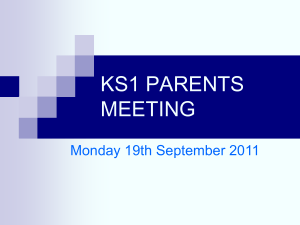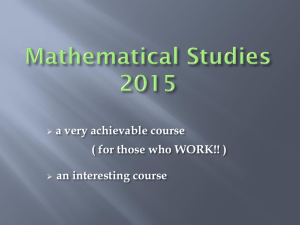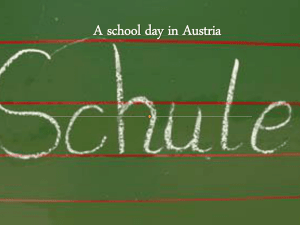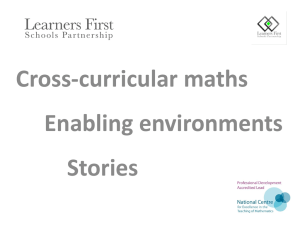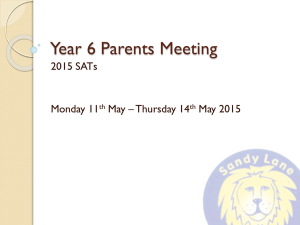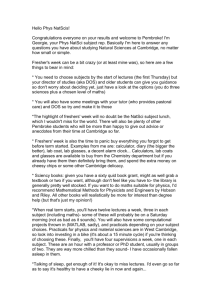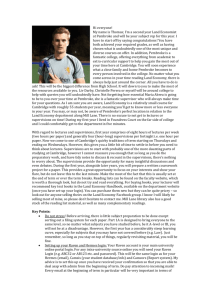The Alternative Guide to Mathematics at Cambridge
advertisement
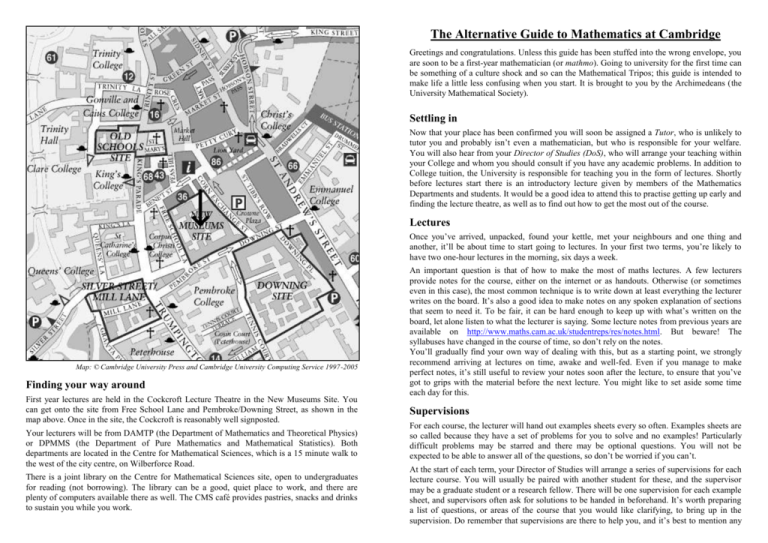
The Alternative Guide to Mathematics at Cambridge
Greetings and congratulations. Unless this guide has been stuffed into the wrong envelope, you
are soon to be a first-year mathematician (or mathmo). Going to university for the first time can
be something of a culture shock and so can the Mathematical Tripos; this guide is intended to
make life a little less confusing when you start. It is brought to you by the Archimedeans (the
University Mathematical Society).
Settling in
Now that your place has been confirmed you will soon be assigned a Tutor, who is unlikely to
tutor you and probably isn’t even a mathematician, but who is responsible for your welfare.
You will also hear from your Director of Studies (DoS), who will arrange your teaching within
your College and whom you should consult if you have any academic problems. In addition to
College tuition, the University is responsible for teaching you in the form of lectures. Shortly
before lectures start there is an introductory lecture given by members of the Mathematics
Departments and students. It would be a good idea to attend this to practise getting up early and
finding the lecture theatre, as well as to find out how to get the most out of the course.
Lectures
Once you’ve arrived, unpacked, found your kettle, met your neighbours and one thing and
another, it’ll be about time to start going to lectures. In your first two terms, you’re likely to
have two one-hour lectures in the morning, six days a week.
Map: © Cambridge University Press and Cambridge University Computing Service 1997-2005
Finding your way around
First year lectures are held in the Cockcroft Lecture Theatre in the New Museums Site. You
can get onto the site from Free School Lane and Pembroke/Downing Street, as shown in the
map above. Once in the site, the Cockcroft is reasonably well signposted.
Your lecturers will be from DAMTP (the Department of Mathematics and Theoretical Physics)
or DPMMS (the Department of Pure Mathematics and Mathematical Statistics). Both
departments are located in the Centre for Mathematical Sciences, which is a 15 minute walk to
the west of the city centre, on Wilberforce Road.
There is a joint library on the Centre for Mathematical Sciences site, open to undergraduates
for reading (not borrowing). The library can be a good, quiet place to work, and there are
plenty of computers available there as well. The CMS café provides pastries, snacks and drinks
to sustain you while you work.
An important question is that of how to make the most of maths lectures. A few lecturers
provide notes for the course, either on the internet or as handouts. Otherwise (or sometimes
even in this case), the most common technique is to write down at least everything the lecturer
writes on the board. It’s also a good idea to make notes on any spoken explanation of sections
that seem to need it. To be fair, it can be hard enough to keep up with what’s written on the
board, let alone listen to what the lecturer is saying. Some lecture notes from previous years are
available on http://www.maths.cam.ac.uk/studentreps/res/notes.html. But beware! The
syllabuses have changed in the course of time, so don’t rely on the notes.
You’ll gradually find your own way of dealing with this, but as a starting point, we strongly
recommend arriving at lectures on time, awake and well-fed. Even if you manage to make
perfect notes, it’s still useful to review your notes soon after the lecture, to ensure that you’ve
got to grips with the material before the next lecture. You might like to set aside some time
each day for this.
Supervisions
For each course, the lecturer will hand out examples sheets every so often. Examples sheets are
so called because they have a set of problems for you to solve and no examples! Particularly
difficult problems may be starred and there may be optional questions. You will not be
expected to be able to answer all of the questions, so don’t be worried if you can’t.
At the start of each term, your Director of Studies will arrange a series of supervisions for each
lecture course. You will usually be paired with another student for these, and the supervisor
may be a graduate student or a research fellow. There will be one supervision for each example
sheet, and supervisors often ask for solutions to be handed in beforehand. It’s worth preparing
a list of questions, or areas of the course that you would like clarifying, to bring up in the
supervision. Do remember that supervisions are there to help you, and it’s best to mention any
problems you have with the course rather than trying to impress the supervisor. Also, if a
particular supervisor isn’t helping you much, or if you are ill-matched with your supervision
partner, talk to your Director of Studies.
The Maths Tripos (Exams)
Cambridge has its own curious vocabulary, which you will get to know sooner or later. A
tripos is a degree course (supposedly because candidates for examinations originally sat on
three-legged stools). Most triposes come in three parts: Part IA (first year), Part IB (second
year) and Part II (third year). Maths also has an optional fourth year, Part III. Part IA comes in
three different flavours: Pure and Applied Mathematics, Maths with Physics, and Maths with
Computer Science. After Part IA, you get to choose whether you want to stay with Maths or
switch to Computer Science or Physics. If you want to change which flavour of IA you are
doing, talk to your Director of Studies.
It is unfortunate that the University require us to sit exams before they will grant us degrees,
but since they do, here’s a brief word about IA exams. Firstly, they don’t count towards your
degree, but your college will probably insist that you obtain honours (a first, second or third) to
continue with the Maths Tripos. This doesn’t mean that you can relax, though; many employers
wanting students during the vacation will ask for your results for each year of your degree.
The IA exams are at the start of June and consist of four three-hour papers covering the first
two terms’ work. Lectures stop a week or so before the exams so you can concentrate on
revision. It is important to have done lots of past papers so you have practice pacing yourself
and selecting questions you are good at. Past papers are available on the internet, in your
College library or from one of the Maths Departments. You are likely to be given revision
supervisions on past papers in the Easter term. Exam results are usually posted on the noticeboards outside the Senate House at the end of May Week.
The Archimedeans’ Patent Survival Kit
In which we present some of the notation which lecturers use but don’t always define:
For all
The following are equivalent
(!)
Required to prove
QED or □
End of proof
WLOG
Without loss of generality
TFAE
RTP
=׃
Is defined to be
Divides exactly
The empty set
Theorem
Important result
Is a member of
Lemma
Baby theorem
Follows from preceding
theorem
Such that
Corollary
s.t. or :
There exists (a unique)
Contradiction
{v1 , v2 , ...}
Is contained by
Is contained by or is strictly
contained by
Set
Implies
[a,b]
Between a and b inclusive
Implied by
(a,b)
Strictly between a and b
Iff or
If and only if
[a,b), (a,b]
Use your imagination!
If a lecturer uses notation you don’t understand, or you can’t read something they have written,
then it’s a good idea to ask for clarification, because other people are likely to be having the
same difficulty.
Useful links
Maths Faculty:
http://www.maths.cam.ac.uk/faculty/
The Reporter:
http://www.admin.cam.ac.uk/reporter/
Lecture lists will be published here as a special number shortly before the start of term.
Student Reps’ Website: http://www.damtp.cam.ac.uk/user/studrep/
Their links to lecture notes and example sheets are particularly useful.
The Archimedeans:
http://www.archim.org.uk/
Official Maps:
http://www.cam.ac.uk/map/
Responsible for the map overleaf. Very useful for finding your way around.
The Archimedeans
Who, then, are the Archimedeans? As well as publishing this guide, we organise speaker
meetings given by eminent mathematicians on all aspects of mathematics. Previous years’ talks
included “Risk, Chance, Gambling and Probability” by Dr Simon Singh, “How to Beat
Children at their Own Games” by Prof John Conway and “The Music of the Primes” by Prof
Marcus du Sautoy.
We also have various social events throughout the year. In your first term here, you’ll be able
to join us at the triennial dinner. We also organise a problems drive and punting trips. The best
way to start your summer holidays next year is to come to the garden party which takes place
shortly after the exams.
Members receive the Archimedeans’ journal Eureka, which is published annually and has an
international reputation. We also run a well-stocked bookshop, which buys and sells secondhand maths textbooks at approximately half the retail price. Many of our members save the cost
of membership on this service alone.
You can sign up to our email lists at the Societies’ Fair at Kelsey Kerridge, and/or buy
membership at our squash, which will be announced in lectures sometime during the first two
weeks. At the squash, you will have the opportunity to enjoy some light refreshments, meet the
committee and other future members.
Before you get here
You can check out our website at http://www.archim.org.uk/, where you can find further
information about our activities and services, and details about membership.
Other than that, our contact details are as follows:
E-mail:
Postal Address:
archim@srcf.ucam.org
The Archimedeans
Centre for Mathematical Sciences
Wilberforce Road
Cambridge CB3 0WA
